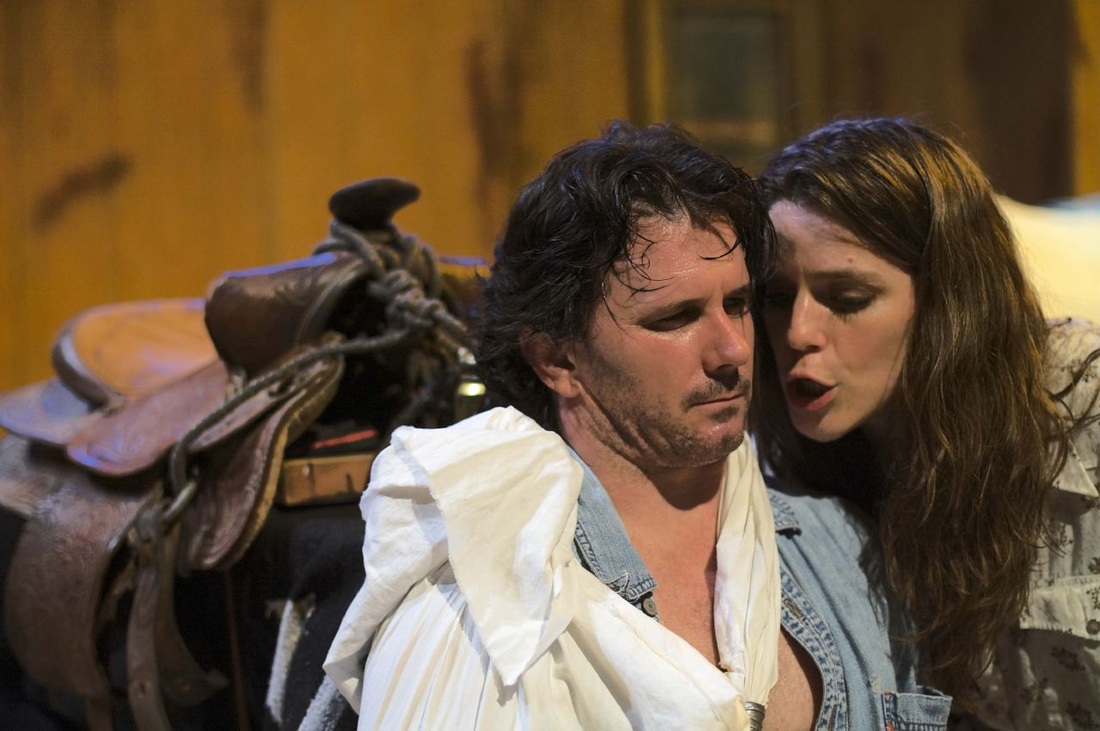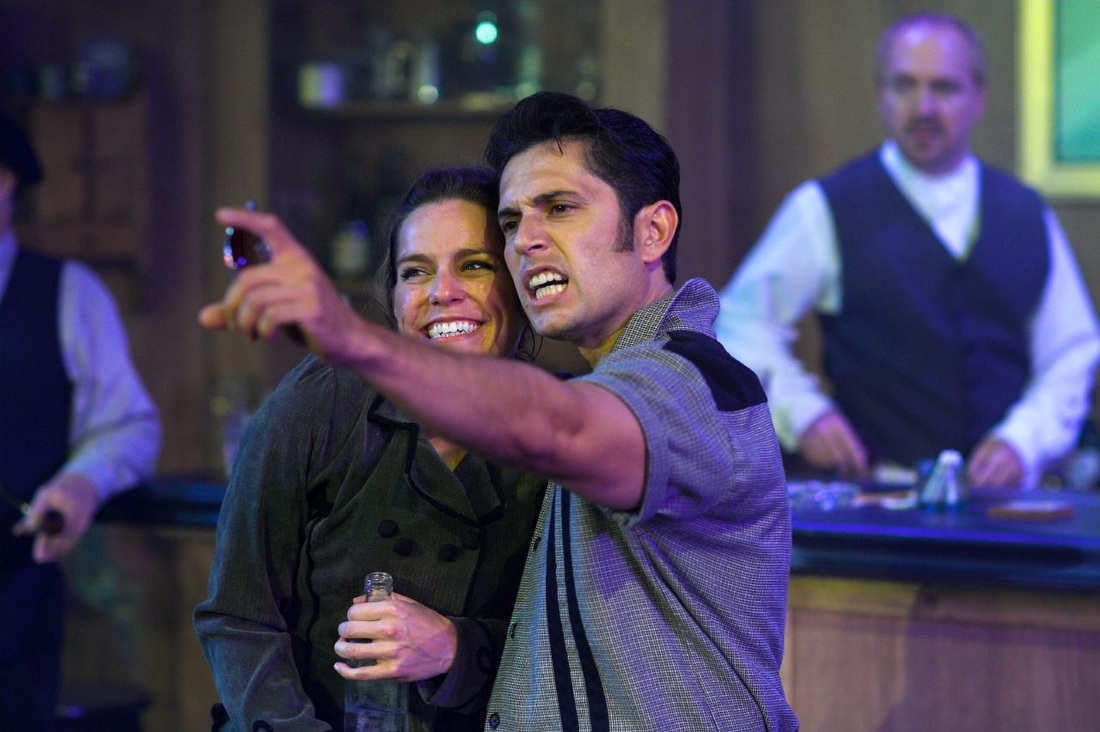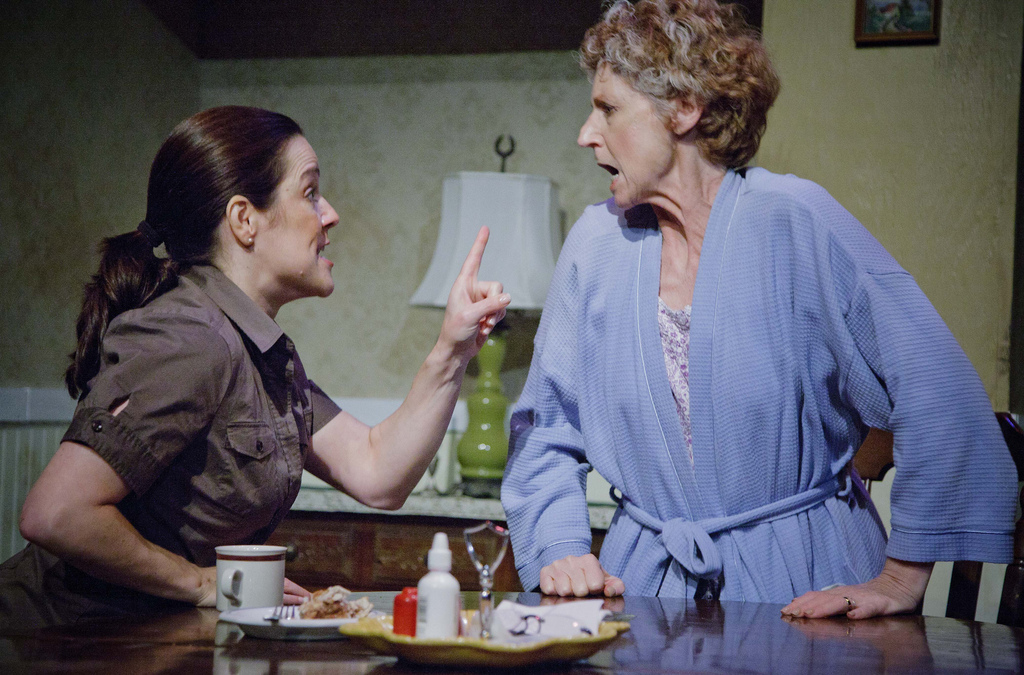|
JACQUELINE LAWTON: Why did you decide to get into theatre? Was there someone or a particular show that inspired you?
SUSAN RHEA: I have loved the theater for as long as I can remember – when I was a kid, I staged plays in the living room (usually directed by and starring me, of course, and featuring my younger sister in all of the supporting roles). And I just kept at it. I’m not sure what started it all; I can’t remember one specific show, or person – though I was blessed with some terrific theater teachers over the years. I feel as though I have always been hyper-curious, almost, about other people (how they move, walk, , react, make decisions….). From way back, I was very interested in the notion of shedding my own skin and donning someone else’s – not that I was unhappy, or had an unhappy life, but that I had a ferocious and insatiable curiosity about being someone else. I guess that’s the best way I can describe what I would call my early interest in acting. My love for making theater in the larger sense (beyond as an actor) came later in life – I directed a bit in undergrad, but more as a matter of course. It wasn’t until I moved to New York and experienced theater in a different a way (in terms of a life in the theater, and what that can mean) that I noticed and nurtured a passion for working with a company, in a collaborative environment, and not just as an actor. I began to sense that, for me, real fulfillment meant being a part of a theater in a more integrated sense, as opposed to pursuing life as an actor independent of an artistic home. I wanted to be a part of an artistic family, and to have a say in the stories that were told and how they were told – I wanted the sense of community and hard work and aesthetic consensus, and the rich rewards of connecting with other people toward a common artistic goal. JL: How long have you served as Associate Artistic Director at your company? What drew you to the position? What keeps you there? SR: I first discovered Keegan as an actor – I had moved back to DC for a range of personal reasons and one of my first auditions locally was for Keegan’s season. I was in a production of TAMING OF THE SHREW in 2000, playing Kate opposite my future husband (though we didn’t know it then!) Mark as Petruchio. Other roles at Keegan followed, and it wasn’t long before I was involved with the company in a range of ways beyond just as an actor. I was intensely attracted to the company (insert Mark Rhea joke here) from the beginning, and for so many reasons – the artistic sensibility, the people, the plays they were producing, the quality of the work. Above all, I could see that Keegan was a true company, a family of artists, and I had always wanted that. So the fact that I had gotten involved with a company who had that collaborative, community feeling – in addition to being a company doing exactly the plays I love, and doing them with such clarity and honesty – it was a perfect fit for me as an artist. I could see that there was no pride in the company – the focus was on the product and not on individual priorities or ego-driven pursuits. I loved that. I began working on marketing materials, helping with the website, serving as the company production manager for a stretch. I’ve worn many hats at Keegan over the years, and I’ve enjoyed them all (well, most of them….). JL: What is the most valuable lesson you learned during your tenure? Also, what skills and traits do you feel a successful artistic director should have to support the health and growth of an organization? SR: I think that I’ve gotten much better at finding the balance between control and release. I have a very strong administrative brain, and I can be a bit of a control freak. I’ve learned how to let relationships and people breathe, and grow – and I’ve learned the profound joy of the discovery that happens when you don’t plan every moment. That was a hard-earned lesson for me, indeed. Running a theater company requires an extremely evolved sense of balance – of personalities, of priorities, all if it. I have a strong creative side, clearly, but I’m one of those artists who also really enjoys administrating and organizing. I like things to run smoothly; I like checklists. I really admire and respect discipline and kindness (as much as I respect talent, honestly), and I think these are qualities that are essential to running a theater company. It’s important to have both a real passion for listening and opening up, and then a real commitment to making decisions and sticking to them. Again: balance. JL: What excites you most about being Associate Artistic Director? What is your greatest challenge? SR: I think the most exciting thing, for me, is feeling an audience respond to our work and knowing all the details that went in to that work (from the person who handed us the script, to the photo shoot, to the first production meeting, to that opening night…). For me, the rich reward lies in being a part of each stage of it, in some way. It’s extremely rewarding and exciting to work as both actor and director with the same company of people. To see all sides of each other, and to feel that thrill when you know you have found something special. Keegan has grown outrageously, too – when I first met the company they were producing a few shows a year in a church basement. To try to put into words the sense of pride that we all feel for how far we have come would be nearly impossible. It is something that I have lived and breathed now for so many years – and the feeling of reward, after so much hard work and heartache and investment, is extremely hard to articulate. I can only say that excitement is an understatement, for me, in terms of how I feel about the future and the work we have done as a company until now. It has given my life as an artist true meaning to be a part of the journey and growth of this theater company. Greatest challenge – well, see the answer above. Finding and maintaining the balance. Mark and I have to remind ourselves to step away sometimes, take a break, think about something else … this can be very hard to do when you work together and share this much passion for the work. It’s hard to keep perspective sometimes, I think, when you run a smaller company – you feel like so much is riding on every single decision. I try to remind myself not to put so much pressure on, all the time. I think choosing the season is one of the hardest things we do – balance is everything there, too. We definitely have our preferences in terms of the kinds of stories and the kinds of structure we respond to and do well, but we have to balance everything against what our audiences want to see and will come to see, what our actors are inspired by and right for, what will fulfill us and keep us well rounded and challenged. I think we’ve done a really strong job but it is very difficult, every year. To see the growth, to hear the audience and listen to what they are saying about the work, that is how we know we’re making the right decisions. I think we are choosing well: finding those stories that people want to see, stories that Keegan will excel at telling, and stories that will be represented particularly powerfully in our intimate venue. But it’s a huge, aching challenge, every year. JL: If your work as an artistic director doesn’t pay the bills, what else do you do? Also, how do you balance your role leading an organization with your work as a director? Are you ever able to direct outside of your company? SR: I’m the website manager at the Alliance for Justice, which is located a few blocks away from the theater. I am extremely fortunate in that I really, really enjoy my work with AFJ too – the people, the mission of the organization, and the job itself. It taps into different skills and uses my brain in different ways, and they are very supportive of my theater life as well. I direct and act almost exclusively at Keegan – this is just the reality of my life right now. There’s rarely time for any outside work – not to mention I am lousy at putting myself out there independently of the company. It just never occurs to me. Having said that, when I do act outside the company, it is a real luxury to JUST act. Eventually, when and if things slow down, I am sure that I’ll get better at responding to and looking for opportunities. JL: Looking at your body of work as an artistic director and a director, how conscious are you and selecting plays by women or people of color when deciding your season? Also, when it comes to hiring administrators, designers and other directors do you take race and gender into consideration? SR: I tend to focus on the story, the script, and rarely the demographic of the writer – I am constantly reading plays, but if I don’t know the play or playwright, I don’t usually check to identify the ethnicity or gender. I just read the play. As far as hiring women designers, directors, and other staff, I think Keegan does a pretty great job of that, even if we do not have a policy. JL: DC audiences are … SR: Diverse, intelligent, plugged in. There’s something for everyone in this city as far as theater goes, and growing theater audiences in general is going to be a challenge as the theater scene continues to thrive and more companies are born. It’s a great challenge to have, but a challenge that will have to be met. There are those audience members who are never going anywhere other than the Kennedy Center – and that’s great, but they aren’t our target audience. We’re doing something different, with a different perspective and obviously on a different scale. We are looking for people who want the stories told as closely (and hopefully as clearly) as we’re going to tell them. In my opinion, our audiences are just lively, sharp people. JL: DC actors, designers, playwright are … SR: Fierce and resourceful, inspired, accessible. I will run out of adjectives here. It’s a great theater town, period. JL: DC critics are ... SR: There are some terrific, thoughtful theater critics in this town, and there are some less terrific, less thoughtful ones. There are critics who see past their own preferences and affections to recognize and discuss the work, and there are some who just can’t. There are some elitists and some non-elitists. Just like any other city, I would imagine. I’d love to see even more robust theater coverage in this city, more celebration of what the theater scene has to offer. I would love to see all of the local critics and media outlets recognize – really observe, respect, and acknowledge -- the full range of companies and not just the work of a few. JL: What advice do you have for up-and-coming theatre artists who have just moved to D.C.? SR: This community is thriving, filled to the brim with committed and inspired artists – take your time and get to know what’s out there. There quite probably is a theater company to suit your artistic disposition and tastes – keep looking until you find the people and the places where you really want to work. Don’t be afraid to ask questions and reach out – I have found it to be a very warm theater town. Also, it’s not a huge community, and by that I mean: WORD GETS AROUND. Work hard and be decent to others. JL: What's next for you as a director and your company? SR: Keegan is in the early stages of a major fundraising campaign to renovate our home at Church Street. There are some pretty significant developments in store, and things are about to get even busier – and more exhilarating – for Keegan. I just directed ALL MY SONS and my next directing for Keegan is THE FULL MONTY, with Mark – we just finished casting a bunch of totally kick-ass people. It’s going to be a blast – it’s always a treat for the company when Keegan lightens things up and has some fun! And of course, we’re in the planning stages for 2013-14 … finding that balance….
1 Comment
Charlie
1/28/2013 03:09:42 am
I have so much respect and admiration for Susan as a director, actress, and most of all, as a human.
Reply
Your comment will be posted after it is approved.
Leave a Reply. |
My BlogI'm a playwright, dramaturg, and teaching artist. It is here where you'll find my queries and musings on life, theater and the world. My posts advocate for diversity, inclusion, and equity in the American Theatre and updates on my own work. Please enjoy!
Categories
All
Archives
June 2020
Reading List
|



